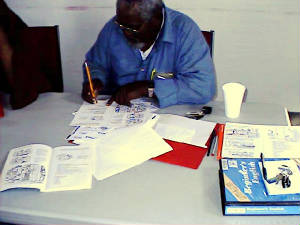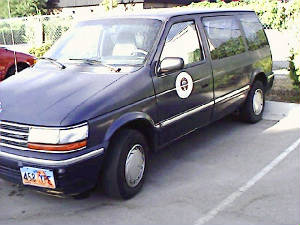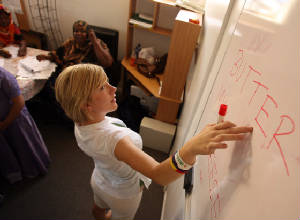|

By coming into exile, most elderly refugees have lost whatever financial security they were able to build up over
the years and they find it difficult to regain their financial status.
Many elderly Somali refugees come from rural backgrounds and arrive in the United States with little formal education
and few job skills. Their chances of getting work are limited. Even those refugees with years of experience in a profession,
trade or craft often find that their talents are not being used because of language difficulties. Highly skilled professionals
are particularly discouraged and frustrated. Many take what they consider to be demeaning jobs; others scrape by on part-time
employment.
Employment
Elderly refugees who do secure employment have typically not worked long enough in this country to build up a pension,
personal savings, or the Social Security benefits needed for a comfortable retirement.
Those who receive support from the government often live with the fear that, for one reason or another, they will
no longer qualify for benefits. Many recipients of public assistance expressed concern that while there is money to pay the
rent and food, there is no spending money to visit friends or to buy extra things.
Although economic self-sufficiency has been the explicit objective of the resettlement program in the U.S., older
refugees are often considered unemployable. Because of their age, they are generally not eligible for enrollment in job training
and employment programs, which would also make them eligible for health and other services.
Because
of their very limited income, subsidized housing is often the only choice for older refugees and this causes a lot of problems
for an already vulnerable population. Public housing complexes are frequently located in poor, racially segregated neighborhoods
which make the integration of older refugees difficult. Concern for physical safety often prevents them from leaving their
houses and isolates them further from their neighbors.
| Somali Community Development of Utah |

|
| Transportation Assistance |
We Provide
Case Management
- Intake, assessment, and service planning
- Counseling
- Referral to community resources
- Assistance with obtaining citizenship, green cards, etc.
Advocacy
- Assistance with accessing healthcare services, Social Security
benefits, food stamps, etc.
- Translation and interpretation
- Transportation to appointments
- Intervention to ensure that elderly clients receive the services
they need
- Inclusion of elderly clients in other program and community activities
Energy AssistanceSomali Community Development of Utah through a partnered with Salt Lake Community Action Program provides weatherization
programs.

|
Elderly refugees represent a small but very vulnerable part of the population of refugees resettled in the United
States. While they obviously have distinct needs depending on their nationality, they also face many similar problems.
In their flight from their home countries, many older refugees have either lost relatives or been separated from
them. Here in the U.S., many refugees lack the family system that supported them in their homeland and would have been expected
to support them as they became less capable of caring for themselves. Even when families are intact, traditional relationships
often change radically as a result of the rapid Americanization of younger members. All of these problems are compounded by
whatever physical and psychological trauma the elderly refugees suffered during their often long and dramatic "journey" to
the United States.
The situation of elderly refugees is unique in many ways. Their problems are more severe than those faced by American-born
elderly or long-time immigrants. The refugees have to struggle with the problems of aging in a new culture that they know
little about. They lack the culturally appropriate coping skills older Americans have developed in the process of socialization
or that some immigrants have acquired.

The Language Barrier
For the older refugee, the problems created by not knowing English go far beyond the inability to acquire and understand
information about the American health care system, to learn about personal safety and civil rights, to bank and shop, and
to use public transportation. Not speaking English, the elders lose their privileged position within the family and the ethnic
community; their authority and wisdom are questioned by the younger generation since they no longer are the teachers and the
advice-givers. Without English, they are unable to establish relationships with members of the host society, and their isolation
is increased.
Most refugee elderly express a desire to learn English but many feel embarrassed when they cannot understand their
teacher or keep up with their younger classmates. The elderly refugees often have a hard time relating to what is being taught
in the English class. Many say that they need "experience to understand some of the things" and cannot understand by "looking
at strange pictures or reading a book."
In traditional African societies, the social position of the elderly is generally very high, both in the society
at large and within the family unit. In extended Somali families, the elderly are "the pillar" of the clan. They provide
other family members with a sense of continuity, strength and support. The elders are treated with great respect as they are
believed to possess a great deal of wisdom. It is they who transmit the cultural values and traditions to their children and
grandchildren.
However, in the United States, school-age children, who usually assimilate language and culture faster than their
parents and grandparents, often find themselves in the unusual role of interpreting that language and culture to their elders,
while the older individuals suddenly find themselves in the position of students. The role reversal is very difficult to accept
for both the older and the younger generation and often causes intergenerational tensions.
Some elderly refugees, however, establish very strong bonds with their grandchildren. This is true especially of
those who have few contacts with their fellow countrymen or the American community at large. They try to compensate for limited
social relationships by devoting a lot of time to the upbringing of their grandchildren. Many older refugees fear that the children will adopt American
attitudes which do not view "old age as a gift from heaven." The refugees say they are very grateful to be in the United States
and to be free from fear of death and persecution. But they usually add that the one problem they see in this land is that
old age is not always viewed positively as a period of tranquility and respect
|

